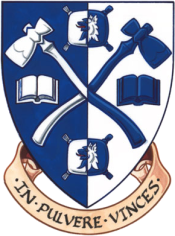Acadia University
 |
|
|
Former names
|
Queen's College (1838–1841) Acadia College (1841–1891) |
|---|---|
| Motto | In pulvere vinces |
|
Motto in English
|
"By effort (literally: in dust), you conquer" |
| Type | Public Liberal Arts University |
| Established | 1838 |
| Affiliation | currently non-denominational; initially founded by Baptists |
| Endowment | $96 million |
| Chancellor | Libby Burnham |
| President | Ray Ivany |
|
Administrative staff
|
211 full-time, 37 part-time (as of 2008) |
| Students | 3,765 |
| Undergraduates | 3,574 |
| Postgraduates | 191 |
| Location | Wolfville, Annapolis Valley, Nova Scotia, Canada |
| Campus | 250 acres (101 ha) |
| Colours | Garnet and blue |
| Athletics | CIS – AUS |
| Nickname | Axemen and Axewomen |
| Affiliations | AUCC, IAU, CUSID, CBIE, CUP |
| Website | http://www.acadiau.ca |
Acadia University is a predominantly undergraduate university located in Wolfville, Nova Scotia, Canada with some graduate programs at the master's level and one at the doctoral level. The enabling legislation consists of Acadia University Act and the Amended Acadia University Act 2000. The Wolfville Campus houses Acadia University Archives and the Acadia University Art Gallery. Acadia offers over 200 degree combinations in the Faculties of Arts, Pure and Applied Science, Professional Studies, and Theology. The student-faculty ratio is 15:1 and the average class size is 28. Open Acadia offers correspondence and distance education courses.
Acadia began as an extension of Horton Academy (1828), which was founded in Horton, Nova Scotia, by Baptists from Nova Scotia and Queen's College (1838). The College was later named Acadia College. Acadia University, established at Wolfville, Nova Scotia in 1838 has a strong Baptist religious affiliation.
It was designed to prepare men for the ministry and to supply education for lay members.
The two major Universities of the day in Nova Scotia were heavily controlled by Denominational structures. King's College (University of King's College) was an Anglican School and Dalhousie University, which was originally non-denominational, had placed itself under the control and direction of the Church of Scotland. It was the failure of Dalhousie to appoint a prominent Baptist pastor and scholar, Edmund Crawley, to the Chair of Classics, as had been expected, that really thrust into the forefront of Baptist thinking the need for a College established and run by the Baptists.
In 1838, the Nova Scotia Baptist Education Society founded Queen's College (named for Queen Victoria). The College began with 21 students in January 1839. The name "Queen's College" was denied to the Baptist school, so it was renamed "Acadia College" in 1841, in reference to the history of the area as an Acadian settlement. Acadia College awarded its first degrees in 1843 and became Acadia University in 1891, established by the Acadia University Act.
...
Wikipedia
